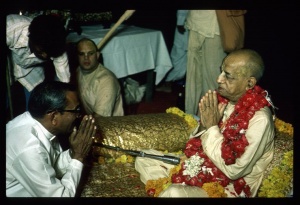CC Madhya 16.208 (1975): Difference between revisions
(Vanibot #0027: CCMirror - Mirror CC's 1996 edition to form a basis for 1975) |
(Vanibot #0020: VersionCompareLinker - added a link to the Version Compare feature) |
||
| Line 2: | Line 2: | ||
<div style="float:left">'''[[Sri Caitanya-caritamrta (1975)|Śrī Caitanya-caritāmṛta (1975)]] - [[CC Madhya (1975)|Madhya-līlā]] - [[CC Madhya 16 (1975)|Chapter 16: The Lord's Attempt to Go to Vṛndāvana]]'''</div> | <div style="float:left">'''[[Sri Caitanya-caritamrta (1975)|Śrī Caitanya-caritāmṛta (1975)]] - [[CC Madhya (1975)|Madhya-līlā]] - [[CC Madhya 16 (1975)|Chapter 16: The Lord's Attempt to Go to Vṛndāvana]]'''</div> | ||
<div style="float:right">[[File:Go-previous.png|link=CC Madhya 16.207 (1975)|Madhya-līlā 16.207]] '''[[CC Madhya 16.207 (1975)|Madhya-līlā 16.207]] - [[CC Madhya 16.209 (1975)|Madhya-līlā 16.209]]''' [[File:Go-next.png|link=CC Madhya 16.209 (1975)|Madhya-līlā 16.209]]</div> | <div style="float:right">[[File:Go-previous.png|link=CC Madhya 16.207 (1975)|Madhya-līlā 16.207]] '''[[CC Madhya 16.207 (1975)|Madhya-līlā 16.207]] - [[CC Madhya 16.209 (1975)|Madhya-līlā 16.209]]''' [[File:Go-next.png|link=CC Madhya 16.209 (1975)|Madhya-līlā 16.209]]</div> | ||
{{CompareVersions|CC|Madhya 16.208|CC 1975|CC 1996}} | |||
{{RandomImage}} | {{RandomImage}} | ||
==== TEXT 208 ==== | ==== TEXT 208 ==== | ||
| Line 18: | Line 17: | ||
<div class="synonyms"> | <div class="synonyms"> | ||
mādhava-dāsa-gṛhe—at the house of Mādhava dāsa; tathā—there; śacīra nandana—the son of mother Śacī; lakṣa-koṭi loka—many hundreds | mādhava-dāsa-gṛhe—at the house of Mādhava dāsa; tathā—there; śacīra nandana—the son of mother Śacī; lakṣa-koṭi loka—many hundreds and thousands of people; tathā—there; pāila daraśana—got His audience. | ||
</div> | </div> | ||
| Line 25: | Line 24: | ||
<div class="translation"> | <div class="translation"> | ||
When the Lord stayed at the house of Mādhava dāsa, many hundreds | When the Lord stayed at the house of Mādhava dāsa, many hundreds and thousands of people came to see Him. | ||
</div> | </div> | ||
| Line 32: | Line 31: | ||
<div class="purport"> | <div class="purport"> | ||
Mādhava dāsa is identified as follows. In the family of Śrīkara Caṭṭopādhyāya, Yudhiṣṭhira Caṭṭopādhyāya took his birth. Formerly, he and his family members lived in Bilvagrāma and Pāṭūli. From there he went to Kuliyā | Mādhava dāsa is identified as follows. In the family of Śrīkara Caṭṭopādhyāya, Yudhiṣṭhira Caṭṭopādhyāya took his birth. Formerly, he and his family members lived in Bilvagrāma and Pāṭūli. From there he went to Kuliyā Pāhāḍapura, formerly known as Pāḍapura. The eldest son of Yudhiṣṭhira Caṭṭopādhyāya is known as Mādhava dāsa, the second son was called Haridāsa, and the youngest son was called Kṛṣṇasampatti Caṭṭopādhyāya. The three brothers' nicknames were Chakaḍi, Tinakaḍi and Dukaḍi. The grandson of Mādhava dāsa was named Vaṁśīvadana, and his grandson Rāmacandra and their descendants are still living at Vāghnāpāḍā, or Vaiñcī. | ||
</div> | </div> | ||
Latest revision as of 09:53, 27 January 2020

A.C. Bhaktivedanta Swami Prabhupada
TEXT 208
- mādhava-dāsa-gṛhe tathā śacīra nandana
- lakṣa-koṭi loka tathā pāila daraśana
SYNONYMS
mādhava-dāsa-gṛhe—at the house of Mādhava dāsa; tathā—there; śacīra nandana—the son of mother Śacī; lakṣa-koṭi loka—many hundreds and thousands of people; tathā—there; pāila daraśana—got His audience.
TRANSLATION
When the Lord stayed at the house of Mādhava dāsa, many hundreds and thousands of people came to see Him.
PURPORT
Mādhava dāsa is identified as follows. In the family of Śrīkara Caṭṭopādhyāya, Yudhiṣṭhira Caṭṭopādhyāya took his birth. Formerly, he and his family members lived in Bilvagrāma and Pāṭūli. From there he went to Kuliyā Pāhāḍapura, formerly known as Pāḍapura. The eldest son of Yudhiṣṭhira Caṭṭopādhyāya is known as Mādhava dāsa, the second son was called Haridāsa, and the youngest son was called Kṛṣṇasampatti Caṭṭopādhyāya. The three brothers' nicknames were Chakaḍi, Tinakaḍi and Dukaḍi. The grandson of Mādhava dāsa was named Vaṁśīvadana, and his grandson Rāmacandra and their descendants are still living at Vāghnāpāḍā, or Vaiñcī.